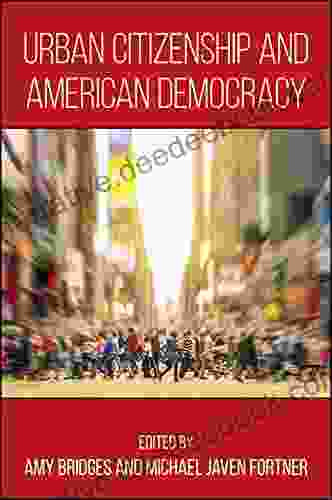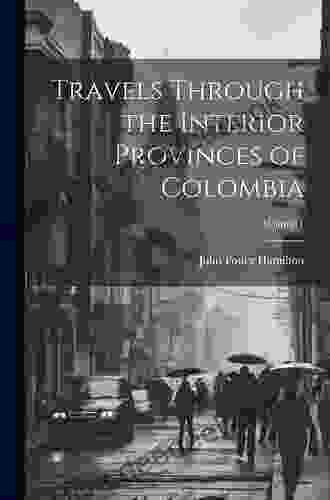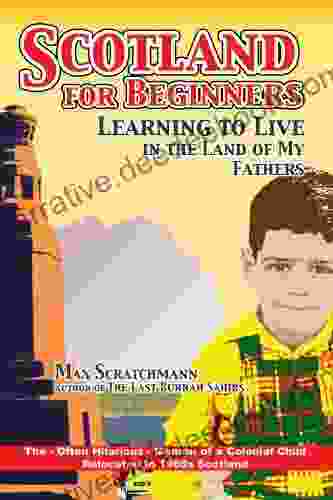Urban Citizenship and American Democracy: A Historical Perspective

The concept of urban citizenship is a complex and contested one. There is no single definition that all scholars agree on, but most would agree that it involves the rights, responsibilities, and privileges that come with living in a city. These can include things like the right to vote, the right to hold public office, the right to receive city services, and the right to participate in the city's political life.
5 out of 5
| Language | : | English |
| File size | : | 6027 KB |
| Text-to-Speech | : | Enabled |
| Screen Reader | : | Supported |
| Enhanced typesetting | : | Enabled |
| Word Wise | : | Enabled |
| Print length | : | 252 pages |
The history of urban citizenship in the United States is a long and complicated one. The first cities in the United States were founded by European colonists, who brought with them their own ideas about how cities should be governed. These ideas were often based on the principles of classical republicanism, which emphasized the importance of civic virtue and participation in public life.
As cities grew and became more diverse, the traditional model of urban citizenship began to break down. New immigrants and working-class residents often found themselves excluded from the political process. In response, a new movement for urban citizenship emerged in the late 19th and early 20th centuries. This movement sought to expand the rights of urban residents and to make cities more democratic.
The movement for urban citizenship was successful in achieving some of its goals. In 1920, women were finally granted the right to vote, and in 1965, the Voting Rights Act made it illegal to discriminate against voters based on their race or ethnicity. However, the movement also faced some setbacks. In the early 20th century, many cities adopted restrictive zoning laws that limited the ability of working-class residents to move into desirable neighborhoods. And in the 1980s and 1990s, many cities experienced a wave of gentrification, which led to the displacement of low-income residents.
Despite these setbacks, the movement for urban citizenship has continued to make progress. In recent years, there has been a growing movement to expand the rights of undocumented immigrants, and many cities have adopted policies that make it easier for residents to participate in the political process. The future of urban citizenship in the United States is uncertain, but it is clear that the issue is a central one in the ongoing struggle for democracy.
The Early Years: Urbanization and the Rise of the City
The concept of urban citizenship has its roots in the ancient Greek city-state, or polis. In the polis, citizens were expected to participate in the political process and to contribute to the common good. This idea of civic virtue was later adopted by the Roman Republic, and it continued to be influential in Western thought throughout the Middle Ages.
In the United States, the first cities were founded by European colonists in the 17th and 18th centuries. These cities were often small and isolated, and they were governed by a small group of wealthy elites. However, as the country grew and became more prosperous, cities began to grow and change.
In the 19th century, the United States experienced a wave of urbanization. The Industrial Revolution led to the growth of factories and other industries, which in turn attracted workers to cities. By 1900, over half of the American population lived in cities.
The rapid growth of cities created a number of challenges. One challenge was how to govern these new urban centers. Traditional forms of government, which were based on small-town values, were often inadequate to deal with the complex problems of urban life.
Another challenge was how to integrate the new immigrants who were flocking to cities. Many immigrants came from different cultures and spoke different languages. This made it difficult for them to participate in the political process and to contribute to the common good.
The Progressive Era: Reforming Urban Government
In response to the challenges of urbanization, a new movement for urban reform emerged in the late 19th and early 20th centuries. This movement, known as the Progressive Era, sought to make cities more democratic and efficient.
Progressive reformers believed that cities should be governed by experts, not by corrupt politicians. They also believed that cities should provide essential services to their residents, such as clean water, sanitation, and education.
Progressive reformers made a number of changes to urban government. They introduced new forms of government, such as the city manager system and the commission government. They also created new agencies to provide essential services to residents.
The Progressive Era was a time of great change for cities. Progressive reformers made significant progress in making cities more democratic and efficient. However, they also faced some setbacks. One setback was the rise of machine politics. Machine politics was a corrupt system of government in which a small group of politicians controlled the city's political process.
The Civil Rights Movement: Expanding Urban Citizenship
The Civil Rights Movement of the 1950s and 1960s had a profound impact on urban citizenship. The movement fought for the rights of African Americans, who were often excluded from the political process and denied access to basic services.
The Civil Rights Movement achieved a number of important victories. In 1964, Congress passed the Civil Rights Act, which outlawed discrimination based on race, color, religion, sex, or national origin. In 1965, Congress passed the Voting Rights Act, which made it illegal to discriminate against voters based on their race or ethnicity.
The Civil Rights Movement helped to expand the rights of urban residents and to make cities more democratic. However, the movement also faced some setbacks. One setback was the rise of white flight. White flight was a process in which white residents left cities for the suburbs. This process led to the decline of many urban neighborhoods and the increased segregation of cities.
The Present: Urban Citizenship in the 21st Century
The 21st century has brought new challenges and opportunities for urban citizenship. One challenge is the rise of global
5 out of 5
| Language | : | English |
| File size | : | 6027 KB |
| Text-to-Speech | : | Enabled |
| Screen Reader | : | Supported |
| Enhanced typesetting | : | Enabled |
| Word Wise | : | Enabled |
| Print length | : | 252 pages |
Do you want to contribute by writing guest posts on this blog?
Please contact us and send us a resume of previous articles that you have written.
 Book
Book Page
Page Chapter
Chapter Text
Text Story
Story Paperback
Paperback E-book
E-book Newspaper
Newspaper Paragraph
Paragraph Shelf
Shelf Foreword
Foreword Preface
Preface Synopsis
Synopsis Footnote
Footnote Manuscript
Manuscript Tome
Tome Classics
Classics Library card
Library card Narrative
Narrative Autobiography
Autobiography Memoir
Memoir Encyclopedia
Encyclopedia Dictionary
Dictionary Thesaurus
Thesaurus Character
Character Resolution
Resolution Librarian
Librarian Catalog
Catalog Card Catalog
Card Catalog Borrowing
Borrowing Archives
Archives Periodicals
Periodicals Study
Study Scholarly
Scholarly Reading Room
Reading Room Rare Books
Rare Books Special Collections
Special Collections Literacy
Literacy Awards
Awards Book Club
Book Club August Nemo
August Nemo Craig R Everett
Craig R Everett Amy Mullins
Amy Mullins Anne Scheller
Anne Scheller Joseph S Kaminski
Joseph S Kaminski Jerica Macmillan
Jerica Macmillan Chris Van Dusen
Chris Van Dusen Shaun Bowler
Shaun Bowler Vicky Mandala
Vicky Mandala Maurice Peress
Maurice Peress Juan Bautista Bergua
Juan Bautista Bergua Crystal Schwanke
Crystal Schwanke Garry Potter
Garry Potter Dawn Dee Miller
Dawn Dee Miller Rafaela Hillerbrand
Rafaela Hillerbrand Alicja Urbanowicz
Alicja Urbanowicz Jorge Van De Perre
Jorge Van De Perre Lois Lowry
Lois Lowry Miranda Asebedo
Miranda Asebedo Anjali Sebastian
Anjali Sebastian
Light bulbAdvertise smarter! Our strategic ad space ensures maximum exposure. Reserve your spot today!

 Isaiah PowellEmbark on a Captivating Literary Journey: Exploring the Expansive World of...
Isaiah PowellEmbark on a Captivating Literary Journey: Exploring the Expansive World of... W. Somerset MaughamFollow ·3.6k
W. Somerset MaughamFollow ·3.6k Tony CarterFollow ·6.7k
Tony CarterFollow ·6.7k Dashawn HayesFollow ·17.1k
Dashawn HayesFollow ·17.1k E.M. ForsterFollow ·13.6k
E.M. ForsterFollow ·13.6k James JoyceFollow ·19k
James JoyceFollow ·19k Rodney ParkerFollow ·11.8k
Rodney ParkerFollow ·11.8k Mark MitchellFollow ·8.6k
Mark MitchellFollow ·8.6k Jayson PowellFollow ·4.3k
Jayson PowellFollow ·4.3k
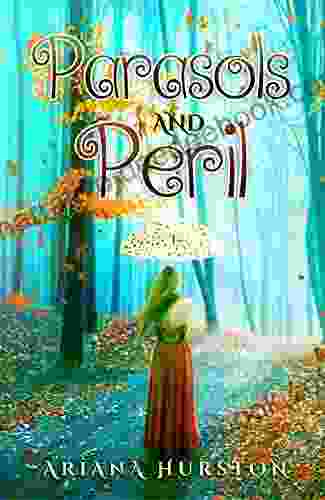
 Dallas Turner
Dallas TurnerParasols and Peril: Adventures in Grace
In the quaint town...
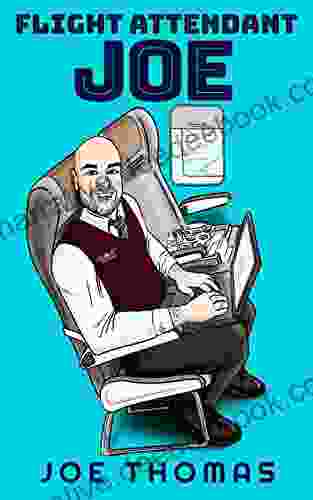
 Caleb Carter
Caleb CarterFlight Attendant Joe: A Dedicated Professional in the...
Flight Attendant Joe...
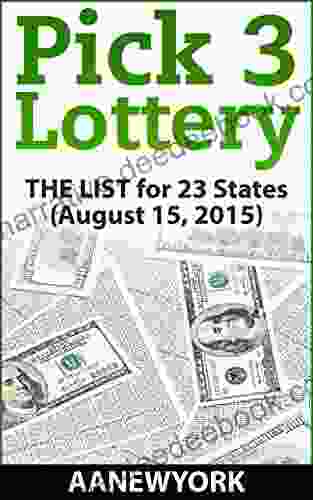
 Jerry Ward
Jerry WardPick Lottery The List For 23 States August 15 2024
The Pick Lottery is a multi-state lottery...
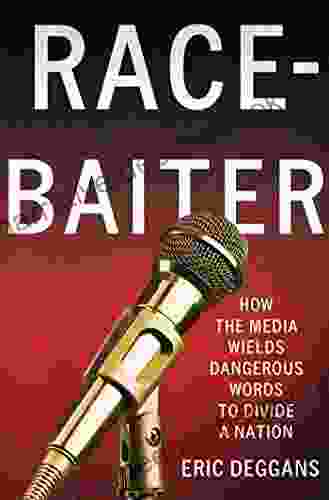
 Hudson Hayes
Hudson HayesHow the Media Wields Dangerous Words to Divide a Nation
In a world where the media is...

 Curtis Stewart
Curtis StewartThe Magic Mala: A Story That Changes Lives
In the realm of ancient traditions and...

 Raymond Parker
Raymond ParkerEarthly Meditations: A Poetic Tapestry of Nature,...
In the realm of contemporary...
5 out of 5
| Language | : | English |
| File size | : | 6027 KB |
| Text-to-Speech | : | Enabled |
| Screen Reader | : | Supported |
| Enhanced typesetting | : | Enabled |
| Word Wise | : | Enabled |
| Print length | : | 252 pages |


